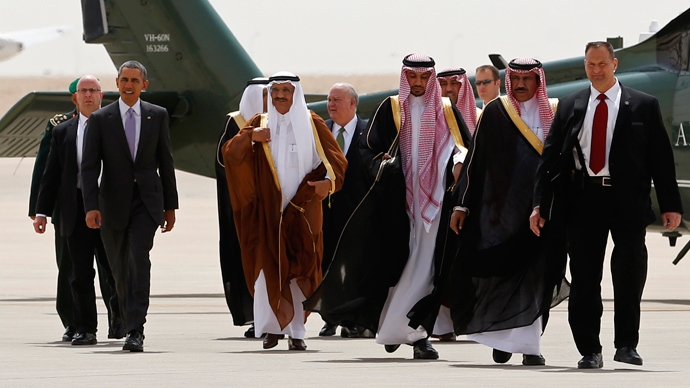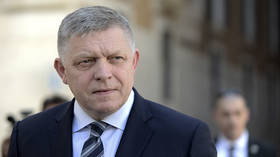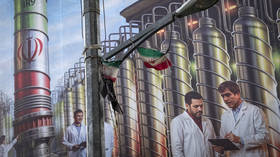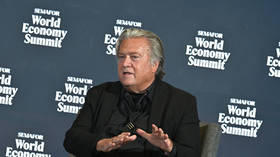Obama in Saudi Arabia: Will Riyadh really go it alone?

Saudi officials are highly displeased over Washington’s overtures to Iran and reluctance to strike Syria and have threatened to break away from the US sphere, but the monarchy may still see an oil-for-security partnership with the US as the safest policy.
Following his visit to Brussels where US President Barack Obama underscored the common values and principles shared between the United States and its European allies, the American president jetted off to meet another strategic ally. Saudi Arabia, a state that is the antithesis of those very western values that Obama passionately espouses, has been in the US sphere of influence for decades, and its opulent royal family has traditionally maintained close personal ties to American leaders. Obama’s visit comes in the midst of a policy rift that has emerged between the two allies over Washington’s policies in the Middle East, which threaten to undermine this significant economic and security partnership. The two allies appear to be strange bedfellows at first glance, but when the relationship is examined within the context of a long-standing geopolitical and economic oil-for-security partnership, lofty rhetoric about western values becomes subservient to the harmonious marriage of convenience. The American president did not raise concerns of human rights violations during his dialogue with King Abdullah, despite the kingdom’s notoriously abhorrent human rights record, which includes the severe repression of women’s rights and capital punishment (often by beheading) for engaging in apostasy, adultery, sorcery or homosexuality. The purpose of this brief visit was to reassure the Saudi leadership their grievances were being heard and Washington desires the same immediate endgame: a pliant new regime in Damascus that will be subservient to US-Saudi interests, and a weakened non-nuclear Iran.
Fraying ties
Relations between Washington and Riyadh were at their lowest in October 2013, when then Saudi intelligence chief Prince Bandar bin Sultan vowed to make a "major shift" in relations with the US in protest over the Obama administration’s decision to backpedal on plans to launch airstrikes on Syria. Members of the Saudi royal family openly derided the UN-backed deal to eliminate Syria's stockpile of chemical weapons and ridiculed Obama for failing to act when his ‘red line’ was crossed. Washington’s attempts to thaw relations with Iran have also irritated Saudi leaders, who deeply resented how US-Iranian talks had been kept secret from Riyadh. Aside from feeling double-crossed by a major ally, the Saudis believe any US-Iran agreement would bolster Tehran and allow Syria's President Bashar al-Assad to remain in power. Saudi Arabia is fuelling a proxy war as the chief financier of anti-Assad jihadist groups aimed at toppling the Syrian government and rolling back the influence of Hezbollah and Iran in the region, while Saudi officials have complained about US constraints placed on the kind of weapons allowed to be funneled to militia groups, arguing that the Obama administration’s reluctance to provide rebels with anti-aircraft missiles has allowed Syrian government forces to make significant gains on the battlefield.

There are also significant differences between the two allies with respect to the Israel-Palestine conflict. Riyadh is disappointed with Washington’s unwillingness to pressure the Israelis into making tough concessions; Saudi Arabia and other members of the Arab League also reject Washington’s decision to back Israel’s demand to be recognized as a “Jewish state,” because doing so implies that Palestinians renounce their right of return. The House of Saud was deeply upset when the Obama administration turned away from Hosni Mubarak during Egypt’s first leadership transition in 2011, giving rise to the Qatar-backed Muslim Brotherhood. Riyadh enthusiastically supported the ouster of elected Islamist President Mohammed Morsi in favor of a Saudi-aligned military junta. Though Washington hasn’t broke away from the new regime in Cairo, leaders in Saudi Arabia volunteered to provide financial assistance to compensate for the suspension of a portion of US military aid, and the two allies have clear differences on the situation in Egypt. As a protest against perceived American inaction and the inability of the UN to effectively ‘punish’ the Syrian government for allegedly using chemical weapons, the leadership of Saudi Arabia famously rejected a seat on the UN Security Council. Though officials from the kingdom point to Riyadh’s rejection of the UN seat as an example of their preparedness to act independently, this gesture ultimately was a pressure tactic to coax the US into taking a harder line.
Going it alone?
Saudi Arabia’s ambassador to Britain published a striking column in the New York Times last year decrying western policies on Syria and Iran as a dangerous gamble, warning that the kingdom would not stand idly by. The op-ed essentially calls for military action against Damascus (and by extension, Tehran) and vows that the kingdom will become more assertive in international affairs. Saudi Arabia has expressed a desire to formulate a new assertive foreign policy doctrine to contest a resurgent Iran and its support bloc, hastened by a deteriorating relationship with Washington as imports of Saudi crude are at their lowest point in two decades in the wake of the US shale oil boom. However, there are few indications that Riyadh has channeled its rhetoric and gestures into a fundamental policy shift; in fact, the opposite may be taking place. The recent shuffling of key officials appears to be designed to ease tensions with the US, allowing both allies to more effectively coordinate in their drive to oust the Syrian government. There are also no indications that Saudi Arabia is defying the US by providing advanced weapons systems to rebel militias fighting in Syria. The Saudis have placed more emphasis on pushing against Assad using diplomatic means. Rather than taking a major policy shift away from the US, the sacking of Saudi intelligence chief Prince Bandar bin Sultan has arguably been an effort to please Washington.

Senior American officials were known to have described Prince Bandar as an erratic and hot-headed character, while US Secretary of State John Kerry complained about his conduct and labeled him as “the problem” when discussing the kingdom’s policy on Syria. Bandar was sacked from his role as the main coordinator of the Syrian dossier and replaced with Prince Mohammed bin Nayef, a personal friend of John Kerry and CIA Director John Brennan who analysts believe is capable of calming relations with Washington. Reports indicate that since the shuffle, the kingdom has pledged to make greater efforts to explore diplomatic avenues to pressure Russia, Iran and Hezbollah. A quieter and less extreme strategy for Syria has been evidenced by a recent decree that bars Saudi citizens from fighting in conflicts outside the kingdom, with a punishment of incarceration for offenders. The decree is sorely disingenuous when considering how Saudi authorities knowingly aided jihadist groups whose members included foreigners and Saudi citizens throughout Syria’s civil war. The policy shift has more to do with clamping down on extremist elements inside the kingdom that may potentially seek to rise up against the monarchy, but it also signals a willingness to appease Washington by flying the flag of so-called ‘moderation’ and taking a more cautious approach.
No break with Washington
There appears to be a spilt in the Saudi leadership between one side that calls for an independent posture, a hardline interventionist stance on Syria, and strategic shift away from the US. The other branch is more cautious and realizes that significant changes to the status quo may pose too much vulnerability to the kingdom. For the moment, King Abdullah has taken the cautious path, and Riyadh is also aware that the US security umbrella is the best bet for regime stability and continuity; the existing rift would have to deepen considerably before any major shift away from Washington can be considered. Though the Saudis have vowed to take a quieter approach on Syria, the significant gains of government forces in recent times have pushed Riyadh to call for equipping rebel forces with man-portable air-defense systems. Prince Mohammed, who has a history of leading counterterrorism operations in Yemen, has attempted to assuage American fears that any advanced weapons would not end up in the hands of extremists. The Obama administration is now mulling the decision whether or not to provide them. Even so, there is no indication that Riyadh plans to go ahead with deploying advanced weapons without Washington's green light, suggesting that the ‘major shift’ promised by some Saudi officials has been sidelined.
Obama’s recent trip to Saudi Arabia came as a response to tactical pressure placed on the administration by the House of Saud, which is not seriously intending to disengage with the US. Oil has always underlined the US-Saudi relationship, and as Gulf exporters turn their attention eastward toward energy hungry developing economies as the US capitalizes on the shale boom, there are slow-motion risk diversification efforts being made that will strengthen Saudi relations with a parallel web of allies. For now, the marriage of convenience looks set to remain in place.
The statements, views and opinions expressed in this column are solely those of the author and do not necessarily represent those of RT.
The statements, views and opinions expressed in this column are solely those of the author and do not necessarily represent those of RT.













